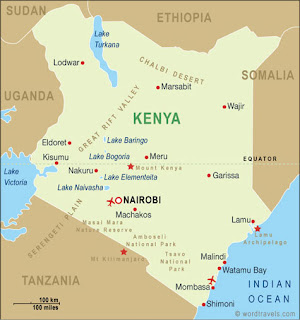 |
| Map of Kenya http://www.wordtravels.com/Travelguide/Countries/Kenya/Map |
This blog post
has been long coming and i am quite glad that I can finally post it!
Kenya has a new
constitution! This is something that my ancestors fought for but never lived to
see the day that we would have reforms on the old constitution, riddled with
problems. Since the euphoria about the constitution has died down, I decided
that I would read through the document to see what the key changes were (for
me) and that’s what I will focus on here.
Since time immemorial,
Kenyans have wanted to have a constitution that was representative of Kenyan
interests, and that ensured that powers did not lie in one person, the
President. It is partly because Kenya did not have an all inclusive
constitution that the former President, Daniel Arap Moi had so much power.
During his reign, key institutions that were meant to protect Kenyans against
corruption, human rights abuses, and ensure a separation of powers in the executive,
judiciary and legislature were destroyed.
It was with
great joy that after the post election violence in 2007 (a very sad part of
Kenya’s history) that the grand coalition parties (Raila Odinga and Mwai
Kibaki) heightened the importance of having a new constitution before the next
elections, now scheduled for 2013 (but still a contentious issue). The entire
process of drafting the constitution was highly scrutinized, and there was
recognition by a majority of Kenyans (including politicians) that it needed to
be as inclusive as possible. In 2010, Kenyans voted, in a referendum for the
draft constitution, and 67% of the population accepted what had been drafted.
On 27 August 2010, Kenya officially had a new constitution.
While I was in Kenya
in December 2011, I noticed from Parliament deliberations that Members of
Parliament (over 95% of them will not be eligible for reelection due to the
changes in the constitution) have been shredding parts of the constitution, and
proposing amendments that would suit their interests. It is a great piece of
document and I think it will be critical for Kenyans to fight for it to remain
intact.
So what makes
this constitution better than the previous one?
The document clearly spells out
the powers of the Judiciary, Executive and Legislature as well as the checks
and balances that should be put in place to ensure the separation of these powers.
I am quite glad that the power to nominate, appoint (without clear scrutiny and
due process) judges, for instance, does not lie in the hands of the President
like it did previously. I am also quite happy that the Chief Justice has real powers
over the Judiciary and that the constitution mandates her/him to fight for the
rights/ independence of the Judiciary
Although members of the
cabinet are nominated by the President, these nominations have to be approved
by the National Assembly. They also have to hold the right educational and
experiential qualifications to hold positions in particular Ministries. This is
a clear move away from the appointment of Ministers based on patronage and
tribalistic affiliations in previous regimes
There has been an introduction
of a new House of Parliament, the Senate, which comprise senators from all 47
counties (also new) in the country. In addition, a National Assembly will
comprise representatives of constituencies (now called Members of Parliament).
Each of the 47 counties will have to elect a woman member of the National
Assembly, which guarantees at least 47 women in the National Assembly, and this
is a great win for those that have fought for gender equality in the political
arena. I am not sure I completely understand the reasoning of having another House
given the financial and logistical implications but one will have to wait and
see how this will add value to debates, and in the end the policies government
and policymakers adopt for the nation
Stemming from the previous
point, I quite like that devolution has now been effected in the constitution
in that the government will now have two levels, national and counties, and
with this comes allocated national budgets but also responsibility for counties
to generate revenue. For a very long time, certain areas in the country have
been neglected either because their Member of Parliament was not strong enough
to lobby for development resources, neglect by national government, or lack of
allocated resources from national government for developmental purposes. This
is quite an achievement, if you ask me.
These last two, i really love!
Kenyans can now enjoy dual citizenship, and the constitution recognises the
existence of gender inequalities in the current societal landscapes and seeks
to end this
Now comes the implementation!
The Kenyan Constitution will remain just that unless Kenyans can defend it,
credible watchdog institutions are established/ strengthened as espoused in the
document, and people stop bickering and get into the ‘doing’ mode. I have
watched/ read in dismay over the last couple of months as the Kenyan Parliamentarians
try to shred the document to pieces to amend sections that they, once upon a
time fought for inclusion in the Constitution. If we let them continue with
this process, we will end up where we started, with Millions gone to the drain,
and with human rights being trampled on.
We are all watchdogs and need to make
so much more noise to defend the Constitution! I am ready to make that noise,
are you?
No comments:
Post a Comment